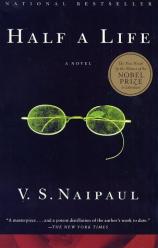Critical Praise
"Naipaul's style is so frank it seems intimate, and the awful characters are studied and well crafted. Behind the matter-of-fact style is a cuttingly ironic view of human relations … When Naipaul talks, we listen."
——Diane Mehta, The Atlantic Monthly
"Naipaul is a master of English prose, and the prose of Half a Life is as clean and cold as a knife."
——J. M. Coetzee, New York Review of Books
"'Half a Life,' the fierce new novel by V. S. Naipaul, the new Nobel laureate, is one of those rare books that stands as both a small masterpiece in its own right and as a potent distillation of the author's work to date … It deftly combines Dickensian delight in character with political and social observation … while recounting with uncommon elegance and acerbity the coming of age of its hero, Willie Chandran ... Mr. Naipaul endows his story with the heightened power of a fable. With 'Half a Life' he has given us a powerful tale of one man's journey from childhood to middle age while at the same time creating a resonant parable about the convulsions of modern history, both the dying of old inequities and the rise of new illusions, and their spiritual legacy of homelessness and dislocation."
——Michiko Kakutani, New York Times
"As sly and funny as anything Naipaul has written … He is still mining his richest obsessions … The classic that his new novel calls to mind is Voltaire's Candide. There is the same mocking simplicity of style, the same heartless elegance of design … Nobody who enjoys seeing English beautifully controlled should miss this novel."
——John Carey, Sunday Times
"A surprise and a pleasure … here, at last, is a work of pure imagination, though the themes are characteristic in their complex peculiarity … Naipaul has produced the most complex and demanding body of work of any post-war British writer … In sentences of great precision and balance, Naipaul reanimates the dilemmas of the late and post-colonial experience … He reminds us again of what a fine and unusual writer he is … In the canon of contemporary British writing he is without peer: a cold, clear-eyed prophet, a scourge of sentimentality, irrationalism and lazy left-liberal prejudices. Read him."
——Jason Cowley, The Observer Review
"Naipaul writes a prose as clean as a stripped wand, but however plain the language, the ideas it delivers are not… . He is still peerless as a deviser of the shocking icon. He builds a scene of metaphysical loss as compelling as any Renaissance canvas of the expulsion from paradise."
——Paula Burnett, The Independent
"As disquieting as anything [Naipaul] has ever written … His terse prose works, as always, to imply a world in a phrase."
——Michael Gorra, New York Times Book Review
"A troubling novel, genuinely moving … disturbing in all the right ways … the scenes of social encounters are brilliant, set against the twilight of colonial rule … A stunning book, three continents, three journeys, the evergreen themes of caste and class, of growing up."
——Betsy Willeford, Miami Herald
"A masterpiece of implicitness … explicitly concerned with drawing out the metaphysical-private while keeping it embedded in society and history … The ironies in Half a Life wind like a fugue into infinity … Identity is an enigma … To make that sentiment breathe in the mouth of a living character, and then rise from the page with silent laughter, is a beautiful completion: the mark of a genius and a cause of unending delight."
——Lee Siegel, Los Angeles Times Book Review


